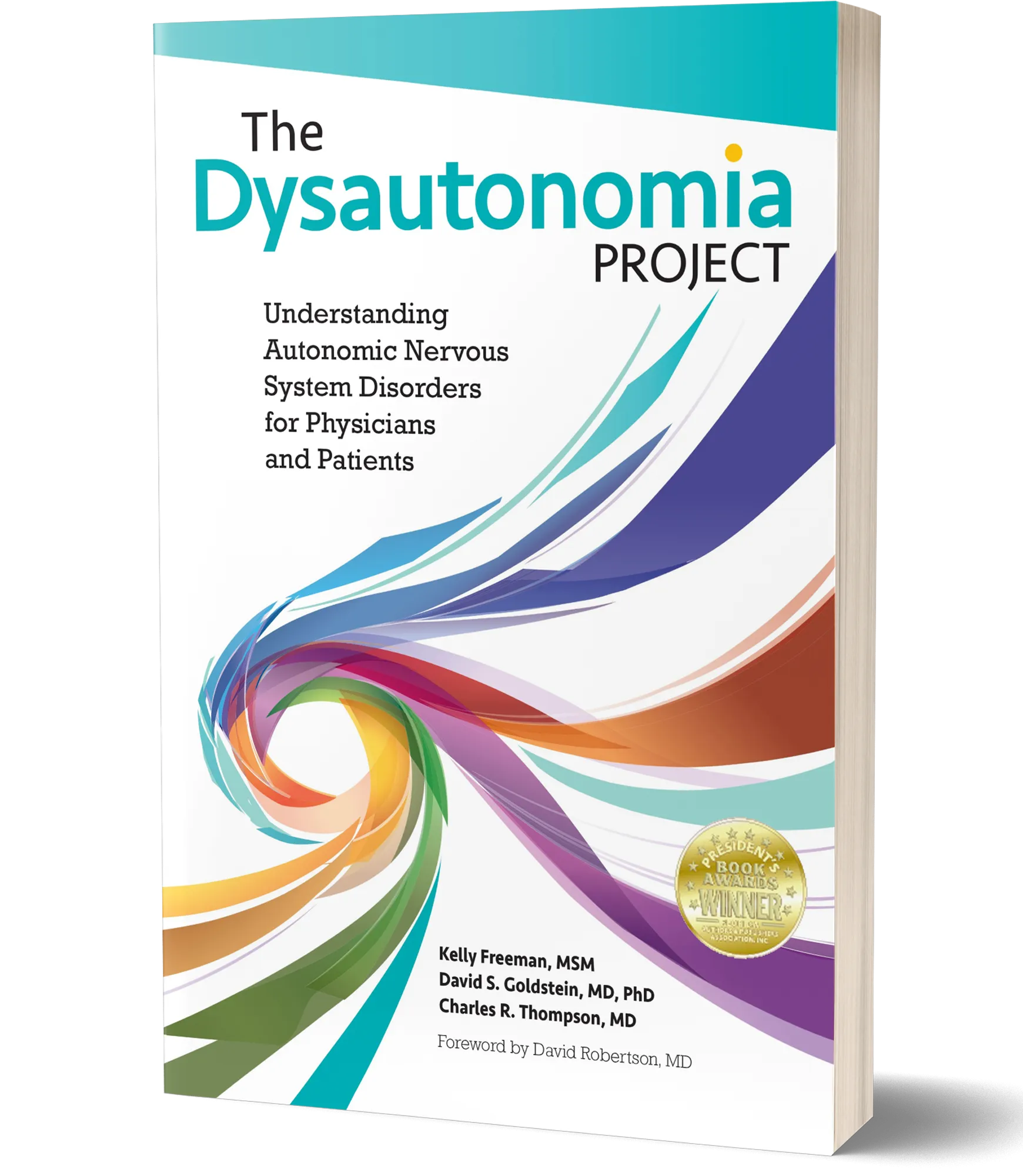Part I: Signs, Symptoms, and How Physicians Diagnose
After years on the DINET forum, one of the common problems discussed among patients are Gastrointestinal (GI) symptoms. When Dr. Matthew Hamilton spoke about mast cells and how they interact in our bodies to cause GI symptoms at the Mastocytosis Society’s Conference in Greenville, SC last fall, I paid attention. At the conference I hoped to learn more about mast cells because along with Dysautonomia, I have also been diagnosed with Mast Cell Activation Syndrome (MCAS). I expected to be one of the only patients in attendance with both a mast cell disorder and Dysautonomia. Strikingly, more than half of the patients I met had some form of Dysautonomia (POTS, Neurocardiogenic Syncope [NCS], and/or Orthostatic Hypotension [OH]). The corresponding mast cell disorders included patients with MCAS but also other disorders along the mast cell spectrum including IgE-mediated Anaphylaxis, Cutaneous Mastocytosis, and Systemic Mastocytosis (SM). Clearly, there is a connection between Dysautonomia and mast cell activation (MCA), but what?
Not enough is known about MCA. However, it may be one of the more important medical findings of our time. In a follow up interview with Dr. Hamilton, he shared there are many theories about the basic mechanisms of MCA that may contribute to GI symptoms including diarrhea and abdominal pain. For example, mast cells may activate near the nerve synapses in the smooth muscle walls surrounding the lining layers of the GI tract possibly changing the “leakiness” of the gut. At this time there is not enough clinical evidence to understand the full relationship between GI problems and MCA. We know that mast cells have the capacity to release chemical inflammatory mediators including; histamine, leukotrienes, prostaglandins, proteases and cytokines. In the GI tract, it is possible that these mediators may be affecting smooth muscle contraction (to increase or slow the propulsion of food through the GI tract) and may increase leakiness and mucus secretion (to cause more watery-type diarrhea). But understanding how MCA works in patients to cause symptoms requires further clinical research.
This is a problem because MCA appears to be more common than initially thought.
It is now implicated in many chronic medical conditions. Dr. Hamilton said, “I’ve never seen something so important” that we better understand because most researchers studying MCA see correlations with other chronic illnesses. It is possible that MCA is occurring in conditions such as Irritable Bowel Syndrome (IBS), Fibromyalgia and Chronic Fatigue Syndrome (CFS). Emphasizing that without further study we can’t be sure about the exact numbers, Dr. Hamilton said, “It is likely that all physicians see at least a handful of these patients in their practices…MCA may be playing a role in as much as 15-20% of the chronically ill patient population”.

Another challenge is that very few physicians know how to assess, diagnose and treat mast cell disorders. Like Dysautonomia patients, MCA patients present heterogeneously with complaints that differ greatly. This makes it difficult for doctors to recognize and diagnose MCA. It is also difficult to know where to refer the patient and to find a local doctor to treat them. Further, most primary care physicians, ER physicians, and even specialty medical physicians are unfamiliar with MCAS. This is why it is helpful when patients know the symptoms and signs of MCA so they can help guide their medical care.
The 3 most common GI symptoms that accompany mast cells disorders are:
Abdominal Pain
(Some component of this is seen in nearly all MCA patients. Note: this is also common in many GI issues.)
Diarrhea
Bloating
Additional GI complaints include: constipation, gastroparesis (slow emptying of the stomach), nausea, vomiting, and reflux (causing heartburn and occasional swallowing difficulties).
When patients are evaluated for the above GI symptoms, health care providers often consider and rule out other inflammatory conditions such as celiac disease, and inflammatory bowel disease (Ulcerative Colitis, Crohn’s disease, microscopic colitis), infections (such as Giardia), malignancy (colon cancer), and functional GI disorders where there is no obvious abnormality detected on testing such as Irritable Bowel Syndrome (IBS). It is important to note that many of these disorders may present with similar symptoms so specific testing may be required to distinguish them.
The symptoms may also include; flushing, dermatographism, memory/ concentration difficulties and headaches. Symptoms tend to wax and wane and may be triggered by various environmental factors such as certain foods, temperature changes, and strong inhaled scents. When present with Dysautonomia it is common to have orthostatic issues, peripheral neuropathies and GI issues that trend towards the upper GI tract including gastroparesis, reflux, and nausea. Although Dr. Hamilton does not specialize in Dysautonomia, he has seen POTS patients in his mast cell clinic. He noted, “MCA appears to be fairly prevalent in the POTS population.”

In diagnosing a patient with MCAS, it is important that the patient and physician look to objective findings rather than the symptoms by themselves.
As noted above, it is also critical to evaluate for other conditions. Dr. Hamilton and others use the following criteria at the Center for Excellence in Mastocytosis at the Brigham and Women’s Hospital in Boston:
- A case history that fits with multiple organ symptoms as listed above.
- Objective laboratory findings such as elevated mast cell mediator levels (such as tryptase in the blood serum, and metabolites of histamine and prostaglandins detected on a 24-hour urine specimen (n-methylhistamine and 11-beta prostaglandin-F2).
- Significant improvement in some or many mast cell symptoms following medical therapy that blocks the mediators (trial of Benadryl with onset of symptoms).
- No other condition that explains the array of presenting symptoms.
The process of diagnosing MCAS and other mast cell disorders along the spectrum can be lengthy and time consuming. It is important that both patient and physician are diligent and that patients strive towards the detection of objective findings that can validate the suspected condition. Although this diagnostic process may be frustrating to the patient, having a high suspicion for a mast cell disorder is a valuable first step.
This article was first published in the DINET 2013 newsletter. Part two of this article was published in 2014: GI Symptoms, Mast Cell Activation (MCA) Disorders & Dysautonomia: Is There a Link?: Observations, Findings and Recommendations Create Hope for the Future
Written by Kelly Freeman, M.S. Edited by Matthew J. Hamilton, M.D.
Dr. Hamilton sees a large number of patients with various mast cell disorders at the Center for Excellence in Mastocytosis at the Brigham & Women’s Hospital and the Harvard School of Medicine where he is on faculty. He specializes in both Gastroenterology and Immunology and has been studying the role of mast cells in intestinal inflammation in the laboratory and through clinical research.
Kelly Freeman, M.S.M. is the Founding Director for TheDysautonomiaProject.org She has several years of experience in health care education and research.
































3 Responses
My MCAS “specialist” has told me the blood and urine tests are only about 50% accurate, and the blood test is difficult to obtain during the window when one is having a flare. I do not present with anaphylaxis and my flares (GI symptoms, fibromyalgia-like symptoms, neuropsychological symptoms) tend to come on slowly. Plus, the rigid criteria for the 24-hour urine sample as far as keeping it at the right temperature all the way through to the moment the lab looks at the sample, makes the process daunting for many of us. I have had colonoscopy biopsy staining that showed elevated mast cells, only to have that result shot down as “a good indicator, but not solid-enough proof” by both my MCAS specialist who ordered it, and a GI doctor I was interviewing to possibly be part of my “team”.
Is there not a better way to screen for MCAS? RIght now I have a “presumed” diagnosis, but even then my doctor is reluctant to give that because I couldn’t tolerate the treatments and therefore diagnosis based on how I responded was also not possible. What do those of us who are extra-sensitive to medications and who have medical trauma have to do to be officially diagnosed?
Thank you for your comment. Another way to screen for MCAS is to empirically trial H1 (Zyrtec, Claritin, Benedryl) and H2 (Zantac or Pepsid) OTC medications. Make sure you are selecting the dye free varieties. If your symptoms improve even 10% with this trial, it is likely you are dealing with a mast cell activation disorder. If you are too sensitive to these medications at their full dose you can ask your doctor to help you order a smaller dose from a compounding pharmacy and gradually increase the dose over time.
I also am “presumed” by my allergist to have MCAS as I manifest many of the system symptoms. I have taken the H1 and H2 blockers for the last year. I was not able to tolerate the Cromolyn NA, or the Singulair which were the other drugs prescribed. I just recently stopped the H2 blocker (famotidine) but continue taking the fexofenadine 180 mg twice a day. I miss one of those and I am in trouble with allergy immediately. I am sensitive to many drugs and have two autoimmune conditions. I suspect dysautonomia as I have a heart rate that accelerates too quickly to >100 with just walking. I get SOB if I try to walk too fast. I have bouts of major fatigue but that could be the Sjogren’s or Hashimoto’s. Too many things could be the cause. I have sleep issues –getting to and staying asleep. I have skeletal cramping nightly so many times that I don’t get deep sleep or much REM many nights. I have constipation and diarrhea GI symptoms as well as abdominal bloating. I have early small fiber neuropathy in my feet.